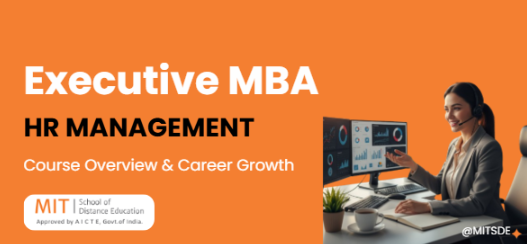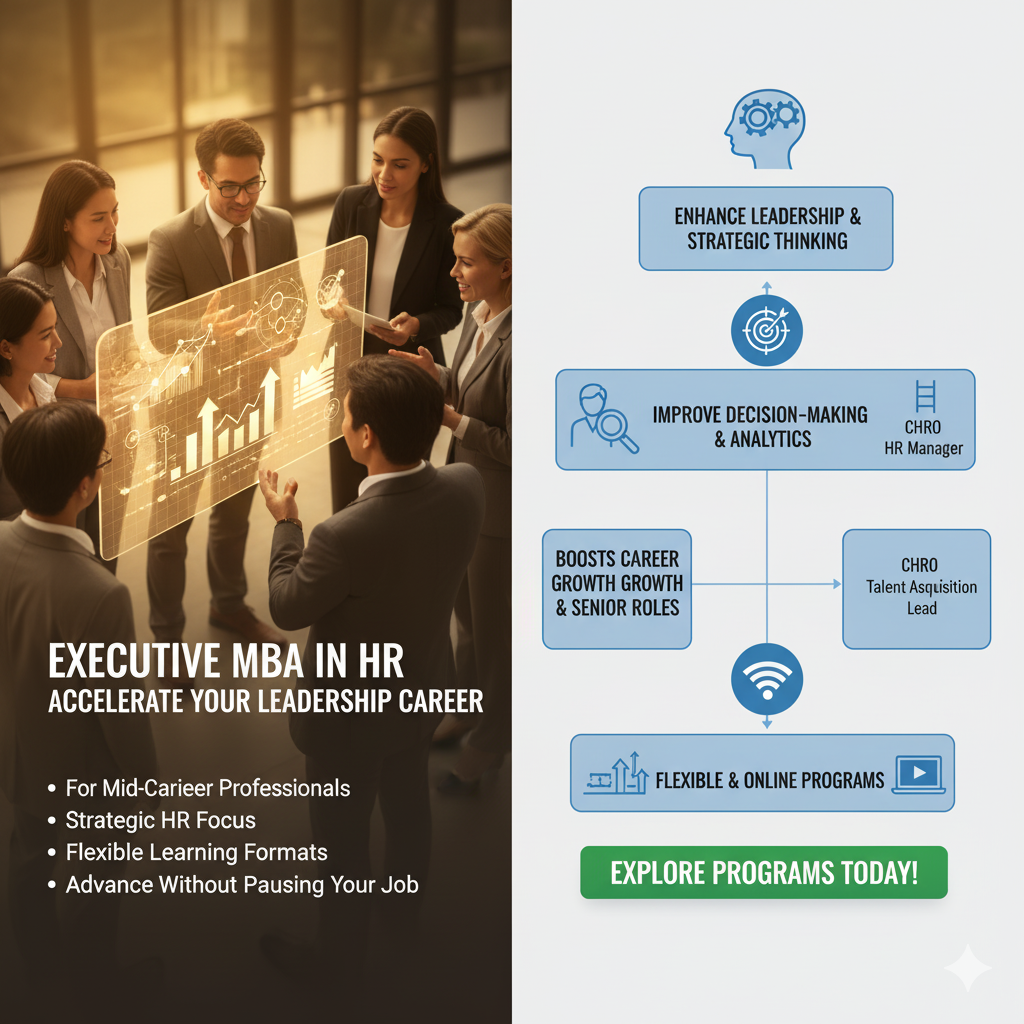
An Executive MBA in Human Resource Management is a specialised management program designed for mid-career professionals who want to strengthen their HR leadership capabilities while continuing their jobs. Whether you’re an HR executive aiming to move into a leadership role or a manager transitioning into HR, an executive MBA HR equips you with strategic knowledge, people-management skills, and modern HR tools needed in today’s competitive corporate environment.
What Is an EMBA HR? — Program Overview
Basic Eligibility Requirements
- A bachelor’s degree from a recognised university
- Minimum 2–5 years of professional work experience (varies by institute)
- Background in HR preferred but not compulsory
- Some institutes may require entrance exams or personal interviews
Professional Prerequisites
- Experience in HR, talent acquisition, workforce planning, or general management
- Understanding of organisational functions, leadership, or team handling
- Motivation to upskill and take on higher managerial responsibilities
Key Features of an Executive MBA Human Resources Program
- Designed for professionals with prior work experience
- Curriculum focused on strategic HR, leadership, HR analytics, and organisational development
- Flexible formats including weekend classes, online, hybrid, and distance learning MBA in HR management options
- Industry-aligned case studies, live projects, and leadership modules
- Ideal for mid-level managers, HR executives, team leads, and business owners
Who Should Pursue EMBA HR?
- HR professionals seeking promotions or senior HR roles
- Managers shifting their career into human resources
- Entrepreneurs who want to improve employee management and organisational culture
- Working professionals looking to strengthen leadership and people-management skills

Eligibility Criteria for Executive MBA in HR
Most universities follow standard eligibility requirements to ensure candidates are prepared for advanced learning.
Basic Eligibility Requirements
- A bachelor’s degree from a recognised university
- Minimum 2–5 years of professional work experience (varies by institute)
- Background in HR preferred but not compulsory
- Some institutes may require entrance exams or personal interviews
Professional Prerequisites
- Experience in HR, talent acquisition, workforce planning, or general management
- Understanding of organisational functions, leadership, or team handling
- Motivation to upskill and take on higher managerial responsibilities
In today’s evolving job market, HR is no longer limited to recruitment and employee management. Organisations now expect HR leaders to drive business growth, develop talent strategies, and promote digital transformation.
Key Benefits of Pursuing EMBA HR
- Enhances Leadership Skills: Learn to manage teams, lead HR initiatives, and influence organisational decisions.
- Builds Strategic Thinking: Gain expertise in workforce planning, HR analytics, and change management.
- Improves Decision-Making: Understand labour laws, performance management, compensation, and training systems.
- Boosts Career Growth: Opens doors to senior HR roles, consulting, and strategic positions.
- Future-Ready Skills: Learn HR technologies, AI-enabled HR tools, and digital HR practices.
Flexible & Distance Learning Options for Working Professionals
Many institutes offer distance learning MBA in HR management and online EMBA HR programs to support professionals who cannot attend regular classes.
Benefits of Distance/Online EMBA HR
- No need to leave your job
- Learn through LMS, live lectures, recorded sessions, and digital exams
- Access to e-books, case studies, and online discussion forums
- Cost-effective compared to full-time executive programs
- Self-paced learning suitable for busy schedules
These flexible learning modes ensure that professionals can balance work, study, and personal commitments seamlessly.
Career Scope After Executive MBA in Human Resource Management
Completing an executive MBA HR can significantly boost your career trajectory. The demand for strategic HR leaders is rising across industries such as IT, manufacturing, BFSI, consulting, healthcare, e-commerce, and retail.
Top Job Roles After EMBA HR
- HR Manager / HR Business Partner
- Talent Acquisition Manager
- Learning & Development Manager
- Compensation & Benefits Manager
- HR Operations Lead
- Employee Relations Manager
- HR Analytics Specialist
- Organisational Development Consultant
- CHRO (Chief Human Resources Officer) – long-term career path
Industry Demand
Companies increasingly rely on HR professionals who can:
- Strategise workforce planning
- Manage employee experience
- Implement HR analytics
- Drive organisational transformation
- Align HR policies with business goals
This makes EMBA HR graduates highly valuable across sectors.
Build Your HR Leadership Career with an Executive MBA HR
An Executive MBA in Human Resource Management is one of the most effective ways for working professionals to accelerate their HR career, develop leadership skills, and stand out in today’s competitive job market. With flexible learning modes, industry-relevant curriculum, and strong career opportunities, it is a smart investment for long-term growth.
If you’re ready to advance your career in HR, explore top-ranked executive MBA human resources programs or apply to a reputable distance learning MBA in HR management today. Take the next step toward becoming a strategic HR leader.


